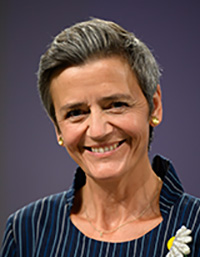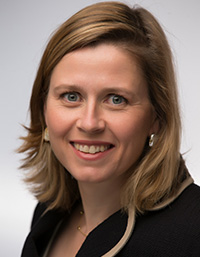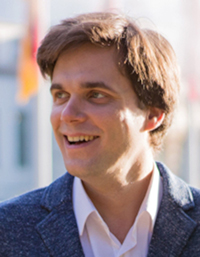Big Tech, Consumers and Inequality
Transatlantic Seminar: Consumer Law, Technology and Inequality
- Date: Apr 20, 2022
- Time: 04:00 PM (Local Time Germany)
- Location: online
Speakers:
Margrethe Vestager (Executive Vice President of the European Commission for A Europe Fit for the Digital Age)
Fiona Scott Morton (Yale University)
Giorgio Monti (Tilburg University)
Sarah Miller (American Economic Liberties Project)
Moderation: Przemysław Pałka (Jagiellonian University in Cracow)
About the topic:
The last session of the Transatlantic Seminar in Consumer Law, Technology, and Inequality will focus on the Big Tech’s impact on consumers’ wellbeing and socio-economic justice, as well as the law’s role in shaping this state of affairs and offering a response.
Digitalization comes with clear benefits – easier access to information for individuals, larger markets for businesses, gains in overall efficiency – and has been supported by law from the very beginning. Yet, a bipartisan agreement exists that the current state of affairs is far from ideal. A litany of problems – loss of privacy, manipulation, fake news and disinformation, hate speech, and online abuse – usually focuses on the same villain: Big Tech. Indeed, platforms like Facebook, Google, or Amazon, have essentially monopolized specific sectors of the economy and assumed the role of “gatekeepers,” reaping enormous benefits without choosing to accept the responsibility that comes with such power.
In the E.U., a large-scale legislative offensive is taking place. Meanwhile, in the United States, not only is such a legislative plan missing; the (otherwise progressive and interventionist) administration does not treat regulation of “the digital” as a priority. Is the U.S. simply lagging behind, while the Europeans figured out what needs to be done? Or is the problem more complex?
About the participants:
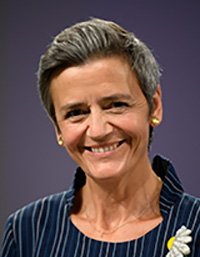
Margrethe Vestager is the Executive Vice-President of the European Commission for a Europe Fit for the Digital Age and Commissioner for Competition. Between 2011 and 2014, she served as Minister for Economic Affairs and the Interior and was Minister for Education of Denmark from 1998 until 2001. In 2012 she served as President of the ECOFIN Council. In 2007 she became Political leader of the Danish Social Liberal Party and remained in this position until 2014. She worked for the Danish Ministry of Finance between 1993 - 1995. Ms. Vestager holds an MSc in Economics from the University of Copenhagen.
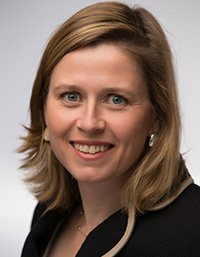
Fiona M. Scott Morton is the Theodore Nierenberg Professor of Economics at the Yale University School of Management where she has been on the faculty since 1999. Her area of academic research is industrial organization, with a focus on empirical studies of competition. The focus of her current research is competition in healthcare markets and the economics of antitrust. From 2011-12 Professor Scott Morton served as the Deputy Assistant Attorney General for Economic Analysis (Chief Economist) at the Antitrust Division of the U.S. Department of Justice, where she helped enforce the nation’s antitrust laws. At Yale SOM she teaches courses in the area of competitive strategy and antitrust economics. She served as Associate Dean from 2007-10 and has won the School’s teaching award three times. She founded and directs the Thurman Arnold Project at Yale, a vehicle to provide more antitrust programming and policy projects to Yale students. Professor Scott Morton has a BA from Yale and a PhD from MIT, both in Economics. She is a frequent speaker at seminars and conferences across the United States and Europe.

Giorgio Monti is Professor of Competition Law at the Tilburg University and research fellow at the Center for Regulation in Europe. He has held positions at the London School of Economics and the European University Institute. He has nearly 30 years of experience in researching and teaching law, with expertise in EU, UK and US competition law in particular. As scientific director of the Florence Competition Programme he helped devise a successful judicial training programme, now in its tenth year, which attracts judges from all EU Member States. He has provided policy reports on a number of EU initiatives, including the Geo-Blocking Regulation and the Digital Markets Act. He is the co-author of one of the leading student books on EU Law and a joint editor of one of the principal journals in the field: the Common Market Law Review.

Sarah Miller is the Executive Director and Founder of the American Economic Liberties Project. Recognized by The New York Times as being “central to making the issue [of antitrust] prominent” and “a thorn in Silicon Valley’s side,” she leads the organization’s mission and strategy to advance a policy agenda to broadly distribute economic power and address systemic corporate concentration. Since launching in 2020, Economic Liberties has quickly become a hub for anti-monopoly expertise and advocacy, and has anchored new action-oriented programs focused on protecting states and communities, national security, and entrepreneurs and smaller businesses from corporate power. Sarah has been profiled in The New York Times and The Washingtonian, published articles in Democracy Journal, Buzzfeed, and The Guardian, and is regularly quoted in national media. Sarah is also a regular advisor to policymakers, serving on President Joe Biden’s transition team and, prior to launching Economic Liberties, as the Deputy Director of the Open Markets Institute. During the Obama administration, she worked as an advisor to the leadership of the Treasury Department and the Center for American Progress, and helped launch and lead the Washington Center for Equitable Growth. In addition to her government service and non-profit work, Sarah has served in senior leadership roles on national political campaigns, first as Deputy Economic Policy Director for Hillary Clinton’s 2008 bid and later as Policy Director for Martin O’Malley’s primary run. Sarah graduated from the University of Chicago with honors and originally hails from Muskogee, Oklahoma. You can reach Sarah at smiller@economicliberties.us.

Przemysław Pałka is an assistant professor of law at the Jagiellonian University in Krakow, Poland, and an affiliated fellow at Yale’s Information Society Project. His research interests encompass the intersections of private/economic law, technology and social justice. In particular, his work critically examines consumer law, data law, legal aspects of artificial intelligence, virtual items and data analytics, and the potential for law’s automation. Currently, he’s the PI for the Private Law of Data Project, funded by Norwegian Grants. Previously, Pałka was Yale’s Fellow in Private Law (2018-2020), holds a PhD (’17) and an LLM (’14) from the European University Institute in Florence, and an MA (’13) from the University of Warsaw. Tweets at @przemekpalka and blogs at https://przemysLAW.technology/.
About the seminar series:

The Transatlantic Seminar on Consumer Law, Technology, and Inequality is a joint initiative of five partners: the Max Planck Institute for Comparative and International Private Law, the Yale Law School Center for the Study of Private Law, Jagiellonian University in Cracow, the Free University in Berlin, and the European University Institute in Florence. The seminar seeks to create a space for sharing knowledge, ideas, and experience across geographic and professional boundaries, with a special emphasis on bringing US and European scholars, policy-makers, and social activists together. Each session will combine speakers who rarely appear together but share interests at the intersections of law, economics, and society.
More information
